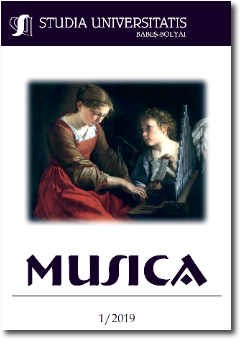DEAD DRAW? AN ENCOUNTER BETWEEN KURTÁG AND BECKETT: THE OPERA FIN DE PARTIE
DEAD DRAW? AN ENCOUNTER BETWEEN KURTÁG AND BECKETT: THE OPERA FIN DE PARTIE
Author(s): Bianca Ţiplea TemeşSubject(s): Fine Arts / Performing Arts, Music
Published by: Studia Universitatis Babes-Bolyai
Keywords: contemporary opera; Kurtág; Beckett; world premiere;
Summary/Abstract: One could consider that over a period of six decades, between 1957 and 2017, Kurtág developed the ever-expanding idea of an opera based on the writings of Samuel Beckett. It started in 1957 when Ligeti, then living in Vienna, strongly suggested to his friend Kurtág, who was based in Paris, to go and see Beckett`s latest plays, En attendant Godot and Fin de partie. The experience inspired Kurtág’s immediate and enduring admiration for the Irish writer and since then, he has come a long way through the labyrinth of his own work. He made use of Beckett in his piece for the Hungarian singer Ildikó Monyók What is the word, then in ...pas à pas – nulle part..., always proving that sounds and words share equal importance in musical setting. With his rich experience and mastery, the 92-year old Kurtág approached his first opera, plunging into the depths of Beckett’s piece Fin de partie; he infused the theatre of the absurd with exquisite lyricism, thus enhancing the metaphorical power of the text with a refined musical discourse. The outcome of seven years of intense work (2010-2017), Kurtág’s Fin de partie surprises the listener by the freshness of its musical language, an accurate translation into sound of Beckett’s poetic theatrical universe. Rather than resulting in a mere tie, this encounter between two great artists sees music and text as equal winners in terms of expressive content, a true collaboration enriching the contemporary dramatic repertoire with a unique masterpiece.
Journal: Studia Universitatis Babes-Bolyai - Musica
- Issue Year: 64/2019
- Issue No: 1
- Page Range: 269-276
- Page Count: 8
- Language: English

